- Home
- Don DeLillo
Great Jones Street (Contemporary American Fiction) Page 4
Great Jones Street (Contemporary American Fiction) Read online
Page 4
“What’s the thing they’re holding?”
“The point is we’ve got the money to make a strong offer,” he said. “People on the Coast. Friends of mine I met in Detroit time before last. They have roots in Detroit, they have roots in Cleveland. Now they’re on the Coast. I’m in a state of fear every minute I’m with them. But these people represent an important part of my development. Fear or no fear, I’m in this thing to the end.”
“You don’t know what the product is, do you?”
“It’s a simple enough guess,” he said. “The point is we’ve got backing. We’ve got resources.”
“Tell your people I don’t know anything. That’s more or less the truth. I’m just a tired old figure of the entertainment world. You know that. Music industry wore me down.”
“I’ll tell them, Bucky, but they won’t listen. In the meantime what’s in that bag that you could put on the stove and heat up to get this chill out of my body?”
“A lumber jacket,” I said.
“One of those old things with red and black checks?”
“I got it at an army-navy store.”
“I wouldn’t mind running out to buy one of those. Except I have to be uptown in about half an hour to talk to some record people. Heavy names. Monsters of the industry. Then get my ass out to the airport. But back to what we were talking about originally. I’d like to get some kind of answer before I leave here. What happens next, Bucky? Are you coming back soon? Or do I book studio space and take the band inside?”
“Submit all questions in writing to my personal manager, care of Transparanoia Inc., Rockefeller Center, New York, New York, New York, New York.”
7
OPEL’S BELONGINGS were everywhere, objects of an earlier life spent in real places, her past on lonely soil. Hers were possessions resonant with time, a sense of years collected, crystal beads, guitar straps, rosewood stash boxes, hardware catalogues, Mexican candlesticks, simplest of things, every one endowed with the power of her absence, electric yogurt maker, ten-foot hand-knitted scarf. I moved the bed to the center of the room. Sleep seemed more possible here.
Fenig came to visit, saying he was in a coffee-drinking mood. I looked around the room for coffee. I looked everywhere without results. Then I looked for cups. There were no clean cups. All the cups were in the sink, sitting inside each other. I looked around for sugar. I tried to find a clean spoon in the drawer of the small cabinet. The drawer was full of string, buttons and penny postage stamps. I began to sweat, a mean animal odor soaking my clothes. I hunted around for a saucer but there wasn’t a single one anywhere, clean or dirty. Fenig liked his coffee black so there was no need to look for cream, milk or half-and-half. Someone shouted in the hall downstairs. I opened the door and we went out and looked over the banister. A man straddled a sample case, waving a brush at us.
“Foreign armless vets of the Second War. A three-dollar sum of money guarantees you selected brushes made by handicapped ex-fighting men. Brushes for home, industry, the car, the toilet. Are you self-employed? Brushes for the self-employed. I’ll listen to bids, anybody in the building, two-fifty to start it off and you couldn’t believe what that sum of money is capable of buying in the way of a pre-selected industrial brush. Armless in the European and Jap theaters of World War number two. They went and they fought. Their names were Ryan, Bandini, Hogan, Ryan. They stepped ashore in strange lands where they didn’t know a soul. This is not stolen merchandise. This is merchandise made and guaranteed by the living maimed of our nation. Iwo Jima, Corregidor, Salerno, Tobruk, Belleau Wood, Bataan, back to Bataan, Iwo Jima, Paris, Norway.”
“How many wars are you selling?” Fenig said.
“Dollar seventy-five I’ll take. A selected car broom. Keeps your dashboard free of foreign matter. Fits any glove compartment, big or little or money back. Jumping out of troop planes. Hand to hand in the trenches. Loose lips sink ships. Graduating from tail-gunner school. Armless and legless. Can’t even salute the flag they died for. Ninety-five cents, I’ll come up and get it; a quarter, just roll it down the stairs. Guadalcanal, Burma, espionage, ack-ack. They fought on the sea, in planes and trains, on motorcycles with sidecars, under the water in submarine warfare. A three-dollar brush made by a vet for fifty cents even, plus tax. Seven patriotic colors. I am not a hustler. This is not a brush hustle. They came from places like Pittsburgh, Grand Rapids, San Diego, Alabama. They went and they fought and they got hurt, some of them, pretty bad. Kansas City, Kansas. Kansas City, Missouri. It was war, it was war.”
We went back inside. I got on my knees and looked in the cabinet space under the sink for some sign of a coffee can. But what sign? Either the coffee can would be there or it wouldn’t. There was no sign involved. I kept at it, determined to conduct an intelligent search. The idea of coffee was overpowering. Finding it and brewing it. Feeling the thick liquid wash down my throat and divide itself into tributaries and attenuated falls. If I could find a clean spoon, the coffee might turn up next. My shirt felt heavy and wet, sticking to my back. There was still hope of locating a trace of sugar somewhere in the room—a lump stuck in the bottom of the box, some brownish fossils to be scraped off the sides of the sugar bowl, assuming the box and sugar bowl existed. Given this or even part of it, I might then find coffee or at least a saucer that might lead to coffee. Signs that serve no purpose are logically meaningless, according to something I’d read once and tried to remember. I had it wrong but that didn’t matter. I was votary and dupe of superstition. If I could find the box of sugar, it would lead me to a clean spoon. Spoon secured, named and agreed on, we pursue the formal concept to its inevitable end, which is coffee. The salesman appeared in the doorway.
“Marks, drachmas, rubles, pounds, shillings, yens. I’ll take anything and everything. The Swiss franc, the French franc, the Bulgarian stotinki. Here, take a brush for a free ten-day home trial. At the end of that time, pay me any way you like. Piasters, pesos, kopecks, bolivars, rupees, dongs. I’m a long-time student of world currency and exchange rates. I bet you don’t know how many puli in the Afghanistan afghani. I bet you can’t guess where the kwacha comes from.”
“You’re talking about thirty years ago,” Fenig said. “These guys are still making brushes?”
There is no need to look for cream, milk or half-and-half (I repeated to myself). Fenig likes his coffee black. There is no need to look for cream, milk or half-and-half.
8
HANES RETURNED one day, minus a few of his soft blond locks, dressed a bit less splendidly than usual. He had few virtues as a messenger but I was convinced Globke’s use of him entailed more serious things. A sort of image-gathering. Maybe Hanes as an image of my public. Or Hanes as Wunderlick-in-exile. He leaned back against the edge of the raised bathtub, tapping his boot heel on the ancient enamel.
“What do they want?” I said.
“Here’s some data from the seventh floor. They thought it should have your immediate attention.”
“What is it?”
“Updated assessments and projections.”
“Of what?”
“I don’t know,” he said. “I just know you’re supposed to look at this column, that column and the other column. The projections are on the overleaf. They want you to be aware of the current status of things. Then you have to sign or initial this memorandum and I have to take everything back to the seventh floor.”
“Stop kicking the tub.”
“There’s a story you’re either doing a concert in England with Watney or you’re making a surprise appearance at one of Watney’s concerts in America.”
“But I’m deceased. I’m deceased, maimed or in Philadelphia.”
“These things aren’t mutually exclusive.”
“You’ve been pondering these matters?”
“I believe in death-in-life,” Hanes said. “One flows through the other. I mean what else is the meaning of a long plane trip spanning continents? What is a three- or four-thousand-mile journey on a 747 e
xcept an example of death-in-life? That’s the trip you’re taking for us. I mean it was your choice and you chose it. You’re dead when we want you dead. Then you land and do a make-believe concert. We put you on and take you off. But it was your choice and you chose it. You could have stayed where you were. Things don’t get better just because they get more simple.”
“I thought you carried signatures back and forth. That’s supposed to be your area of competence.”
“I don’t do anything,” he said. “I’m just here—or there. People use me for whatever they want. It’s a way of existing. Everybody has a way and this is mine. It’s no better or worse than anybody else’s.”
His voice was malted milk, pleasant and soporific, an Eastern drawl, but determined to mingle certitude and defeat, as if the first could lead nowhere but to the second. Hanes seemed impatient with the world for not knowing the things he knew. The beauty of surrender. The logic of wistfulness. The old age of youth. As I listened I thought a featureless baggy man was striking me in slow motion with a well-polished stone. I moved to another chair, more supple, nearer the window. Some workers placed a guardrail around an open manhole; one of them attached a danger flag and another began to descend. It was late morning. Hanes gave me a piece of paper, then reassumed his stance at the bathtub. I was completely relaxed, melting into the chair.
“That’s the memorandum of intent,” he said. “You have to sign it or initial it.”
“Whose intent?”
“The seventh floor wants you to read it and sign it.”
“Can’t be bothered, tell them.”
“You won’t read it?”
“No,” I said.
“Will you sign it then?”
“No.”
“How about initialing? Will you initial it? Then I can take it back up to seven and they can process it. Or whatever they do. I don’t get to seven very often.”
“You didn’t bring any cash this time. Why is that, Hanes?”
“They said you’ve spent it all.”
“Funny. That’s nearly funny.”
“You’ve spent it all, they said.”
“It would take eight men eight lifetimes each to spend the money I’ve earned.”
“What you haven’t spent is tied up. You’ve spent a lot.”
“What’s tied up mean?”
“It’s working. They’ve put it to work.”
“Who exactly?”
“The sixth floor.”
“I don’t want it working,” I said. “I’m the one who works. I want my money to sit quietly. That’s my idea of the value of money. While I work and sweat, I want to think of my money resting in a cool steel-paneled room. It’s stacked in green stacks, very placid and cool, resting up. I realize this isn’t everybody’s approach to money. But it’s my approach and I like it. I envision luminous green stacks. A stainless-steel room. Hundreds of neat green stacks. I don’t like to think of money working. I’m the one who works.”
“Except you don’t seem to be,” Hanes said.
I think I slept then, a shallow drop, one level down. A sound seemed to reach me, murderously well regulated, as of sheets of paper sliding out of a Plexiglas machine. I opened my eyes and Hanes was still there, looking down at me, talking right through my sleep, his world-weary TV voice hovering at perfect modulation.
“I like to masturbate in the men’s room on six,” he said. “Afternoon is best. They’re all drugged from lunch. Sitting in their pastel offices. Droning into the phone. I know I’ll never get to that point. Their point. I’d rather be used than use others. It’s easy to be used. There’s no passion or morality. You’re free to be nothing. I read their mail. I look in all the confidential files. When I deliver personal notes from floor to floor, I read them in the stairwell. I feel I’m free to do these things. The only thing that unfrees me is music. The men’s room on six. I wouldn’t try it on seven. I rarely go to seven. The Glob is moving up there next week. He’ll probably take me with him but maybe he won’t. He’ll leave me where I am. That’s probably what’ll happen. The underground’s come up with a superdrug. Did you hear about that? The news leaves me cold frankly. Music is the final hypnotic. Music puts me just so out of everything. I get taken beyond every reference that indicates who I am or how I behave. Just so out of it. Music is dangerous in so many ways. It’s the most dangerous thing in the world.”
Late in the day it snowed. The men on the radio went wild with news of heavy snow. They seemed unable to stop talking, station after station, into the night, bulletins, announcements, news specials. Every station was on alert for more news of the snow. Programs were interrupted. Announcers sounded close to insanity, their voice levels soaring. Snow watch. Snowplows. Heavy snow. Snowstorm. Deep snow. Big white snow. These men had never in their lives reported stories so full of documentation. It was snowing in this place and that place. It was piling up. It was drifting across the by-passes and interchanges. Their voices nearly cracked with unprecedented mad lyricism as they gave their authoritative reports. It was real snow and it was falling now, at this identifiable point in time. Motorists, pedestrians, vehicular traffic, suburban thoroughfares, snow emergency routes, snow removal equipment, sanitation crews, salt spreaders, accumulations, bridges and tunnels and airports. Snow was coming down out of the sky. It was falling on the city and on the countryside. Big white snow.
Then it stopped. Everywhere the snow stopped falling. The announcers tried to calm themselves. Their disappointment wasn’t easy to conceal. Disaster and its various joys had made them hoarse, brought them close to sobs, and now they had to dig themselves out of this massive ecstasy. It was a letdown for everyone. A pre-recorded church service came on and then there was a knock and Fenig appeared at the door, hooded, carrying two paper cups by their shaky handles, his face framed in rising smoke. It was about midnight. I turned off the radio. The house was quiet and no traffic moved on the street. I was beginning to feel completely awake. Fenig seemed tired, bent forward in a chair, slowly knocking his knees together.
“Good coffee,” I said.
“It’s not instant. I never drink instant.”
“I don’t think I have anything in the house to eat in case you’re hungry.”
“It’s not hunger that gnaws at me, Bucky. It’s a strange kind of fatigue. I get this way from not working. I can’t get any work done. But it’s not really fatigue. It’s non-fatigue, worse in every way. I’ve had an unproductive eight hours at the typewriter and I haven’t sold a thing in almost two weeks. There’s no worse feeling than the feeling you get from being unproductive. I jabbed away at that machine all day and nothing happened. Same few sentences. Where’s your sugar?”
“I don’t know. Maybe in that cupboard. But I doubt it.”
“Never mind, I’ll drink it bitter. I threw my sugar away because it had a little shriveled corpse in it. Roach-family type thing. You get any down here?”
“I haven’t noticed.”
“I’ve written millions of words,” he said. “Every one of them is in that trunk upstairs. I’ve got copies of everything I’ve written since the beginning. Do you want to know when the beginning was? Before you were born. I had my first story published before you were born. When were you born, just out of curiosity?”
“A few weeks from now twenty-six years ago.”
“I had my first story published before you were born.”
“But nothing lately.”
“But nothing lately and that’s what counts. It’s really fatiguing. All day at the typewriter to type the same few sentences. Were they mediocre sentences? I frankly don’t know the answer to that. My response to that has to be that I honestly and truly do not know. Maybe I’ll know tomorrow. Maybe never.”
“You haven’t been pacing,” I said.
“I haven’t been pacing.”
“At least I haven’t noticed.”
“I haven’t been pacing and that’s because it hasn’t worked lately. I have to change my routi
ne. I have to make an alteration in my format. These things are tricky things. The market’s out there spinning like a big wheel, full of lights and colors and aromas. It’s not waiting for me. It doesn’t care about me. It ingests human arms and legs and it excretes vulture pus. But I understand that. I’m attuned to that.”
“Do you hear anything?”
“No,” he said.
“Hear that?”
“It’s just the kid. Downstairs. The retarded boy. Micklewhite. Her deformed kid.”
“What’s he doing?”
“Dreaming.”
“I’ve never heard a sound like that.”
“That’s the way she says he dreams. That’s the sound that comes out when he’s having a dream. Good thing it’s not too loud.”
“You were saying something,” I said.
“The big wheel.”
“I don’t remember that.”
“The big wheel’s spinning out there, full of lights and bright colors and crazy sounds.”
“Right, the market.”
“Fame,” he said. “It won’t happen. But if it does happen. But it won’t happen. But if it does. But it won’t.”
“You never know.”
“It won’t happen. But if it does.”
“What if it does? What then?”
“I’ll handle it gracefully. I’ll be judicious. I’ll adjust to it with caution. I won’t let it destroy me. Fame. The perfect word for the phenomenon it describes. Amef. Efam. Mefa.”
“When do you sleep?” I said.
“I sleep when sleep is feasible. When it’s no longer productive to write. I’m working in a whole new area. I guess that’s why it’s coming so slow. Pornographic children’s literature. But serious. Not some kind of soft-core material in a comic vein. Serious stuff. Filthy, obscene and brutal sex among little kids.”
“Is there a market?”
“I think this may be the only untapped field in all of literature. Although you never know for sure. Maybe there’s somebody working away right now, trying to pre-empt a corner of the market. Once you pre-empt, you’re good for years. Send them bird shit wrapped in cellophane, they’ll buy it. So I may be too late. There are people typing away all over the place, trying to wedge themselves into little corners of the market. But to get to your question, the answer is yes. Everything is marketable. If no present market exists for certain material, then a new market automatically develops around the material itself. My own brand of porno kid fiction is pretty specific. It has no adults. It is sexy-brutal in a new kind of way. It panders to the lowest instincts. It is full of cheap thrills. It has elements of primeval fear and terror. It has titless little girls saying bad words. It has an Aristotelian substratum.”

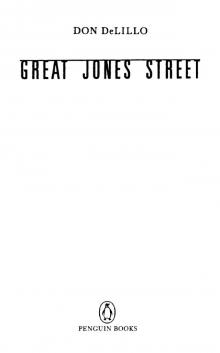 Great Jones Street (Contemporary American Fiction)
Great Jones Street (Contemporary American Fiction)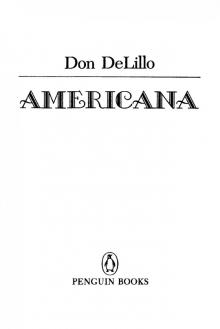 Americana
Americana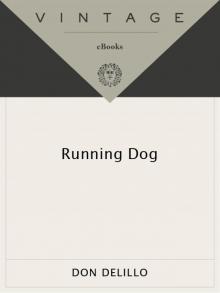 Running Dog
Running Dog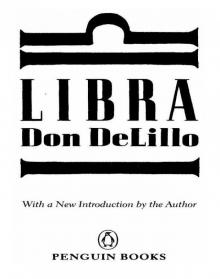 Libra
Libra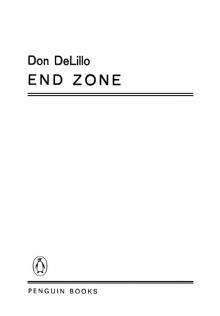 End Zone
End Zone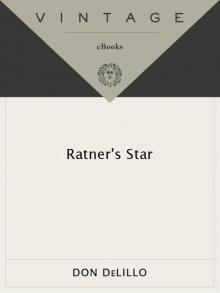 Ratner's Star
Ratner's Star Underworld
Underworld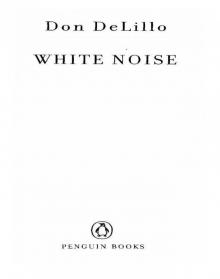 White Noise
White Noise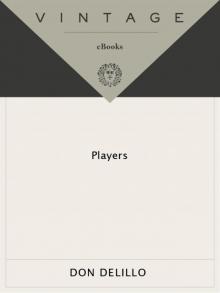 Players
Players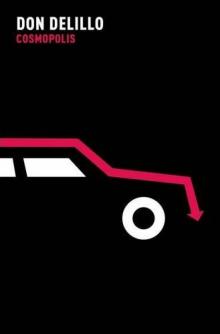 Cosmopolis
Cosmopolis The Silence
The Silence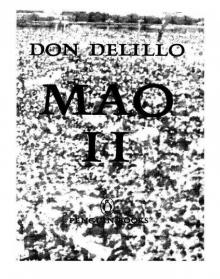 Mao II
Mao II Zero K
Zero K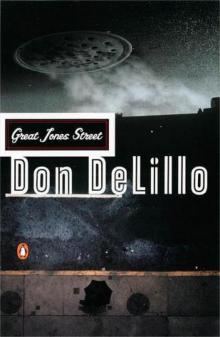 Great Jones Street
Great Jones Street The Angel Esmeralda
The Angel Esmeralda The Names
The Names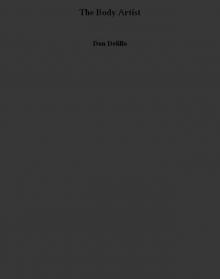 The Body Artist
The Body Artist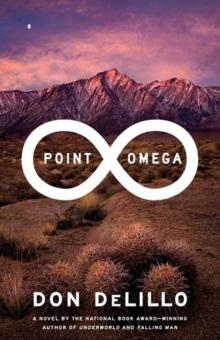 Point Omega
Point Omega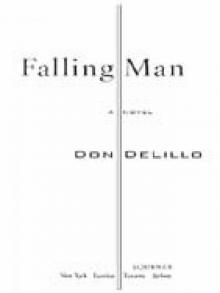 Falling Man
Falling Man